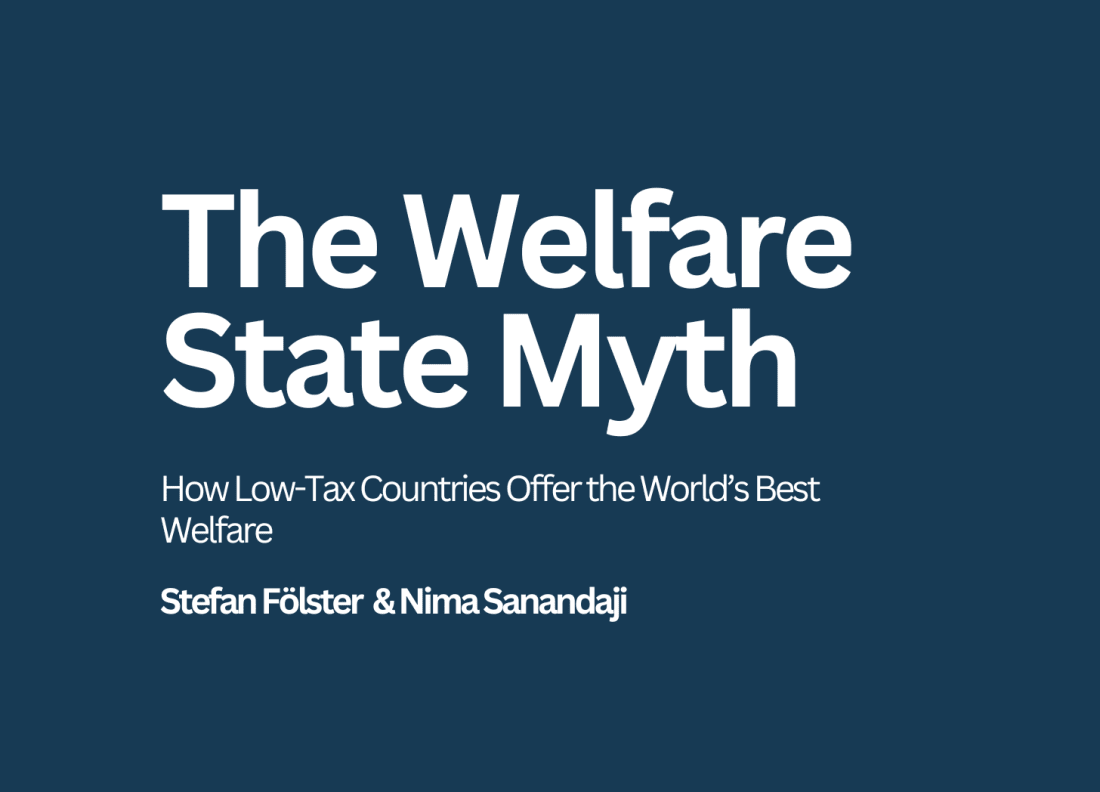|
by Stefan Fölster & Nima Sanandaji
Low-tax countries now dominate welfare quality rankings while high-tax nations struggle, new analysis shows
Britain has suffered a catastrophic decline in welfare performance, falling to 22nd place in life expectancy and ranking just 15th overall despite a record tax burden and ballooning welfare spending
The Nordic model has collapsed as a welfare benchmark with Sweden plummeting from 1st to 8th in life expectancy as its tax burden soared to 43% of GDP
Shadow Chancellor Sir Mel Stride: “This report offers a timely reminder that higher taxes, higher spending and higher welfare are not the route to a fairer, more prosperous economy.”
Richard Tice: “This research confirms what we’ve known all along.”
The top-performing countries on welfare outcomes are low-tax Switzerland, Japan, and South Korea
New analysis published today by the Institute of Economic Affairs busts the myth of Nordic-model high-tax welfare superiority that has dominated political discourse for decades, and delivers a devastating verdict on Britain’s welfare performance as the tax burden and welfare budgets have ballooned.
The study compares welfare outcomes across 23 OECD nations using measures covering health, education, unemployment, and social exclusion. The findings present a radical challenge to the common idea that improving welfare outcomes requires higher taxes and more spending. It suggests that ‘welfare state crowding out’ is an increasing problem, where high-tax and spend approaches waste resources and crowds out some of the most essential welfare state tasks, market welfare services, precautionary saving and insurances as well as the role of the family.
“The Welfare State Myth” by Nima Sanandaji and Stefan Fölster, reveals that Britain is failing its citizens across virtually every measure of welfare quality despite a record high tax burden. Britain’s welfare crisis is starkest in healthcare, where the country ranks 20th, despite the NHS being Europe’s largest single employer. With over 7 million people on hospital waiting lists, the UK’s health system delivers outcomes that would be scandalous in successful low-tax countries. Switzerland, with a 27% tax burden compared to Britain’s 33%, achieves dramatically superior health outcomes through efficient private insurance models.
For decades, UK policymakers have looked enviously at Nordic welfare states. Yet Sweden, long held up as the gold standard, now ranks 12th overall despite a 43% tax burden. Sweden’s decline coincides precisely with its transformation into a high-tax state - it topped life expectancy rankings in 1970 when it had a 35% tax burden.
The research arrives as the government grapples with an unsustainable welfare spending crisis, with Universal Credit and PIP costs continuing to rise and parliamentary rebellions against the welfare bill making reform difficult.
Today’s analysis demonstrates what Britain could achieve. Japan leads global rankings with a 30% tax burden, followed by South Korea (26%) and Switzerland (27%). Australia, Ireland and New Zealand all achieve better welfare outcomes than the UK with similar or lower tax burdens.
Sir Mel Stride, Shadow Chancellor and former Secretary of State for Work and Pensions, said:
“This report offers a timely reminder that higher taxes, higher spending and higher welfare are not the route to a fairer, more prosperous economy.
“We have to get away from the idea that every problem can be fixed simply by pouring more money into public services or welfare.
“We don’t need bigger government. We need a more efficient state that can deliver both better outcomes and better value for taxpayers.”
Richard Tice, Deputy Leader of Reform UK, said:
“This research confirms what we’ve known all along. Successive Labour and Conservative governments have bloated public spending and burdened us with ever higher taxes, yet we get less and less in return.
Nima Sanandaji, Director ECEPR and co-author of the report said:
“On basic measures of health, Britain is underperforming compared to its rich-world peers. Our data clearly show that in order for the UK to excel in welfare it should shift to a lower tax model. Countries with lower taxes have the same or sometimes better health outcomes, and systematically better outcomes in terms of school results and lower unemployment. High-tax models create poverty traps of welfare dependency, particularly amongst those with immigrant backgrounds.”
Stefan Fölster, Director Better Future Economics and co-author of the report said:
“The idea that the ‘Nordic model’ of higher taxes to deliver better welfare no longer stacks up. Nordic social and economic success was built during periods of low taxes, and stagnated in relative terms after shifting to high taxes.
“Instead, the countries that do better in terms of welfare outcomes are increasingly those with lower tax burdens. Politicians must consider this as they try to address the twin problems of a faltering welfare state and a generational-high tax burden.”
You’re currently a free subscriber to Insider. For the full experience, upgrade your subscription.
Paid subscribers support the IEA's charitable mission and receive special invites to exclusive events, including the thought-provoking IEA Book Club.
We are offering all new subscribers a special offer. For a limited time only, you will receive 15% off and a complimentary copy of Dr Stephen Davies’ latest book, Apocalypse Next: The Economics of Global Catastrophic Risks.
